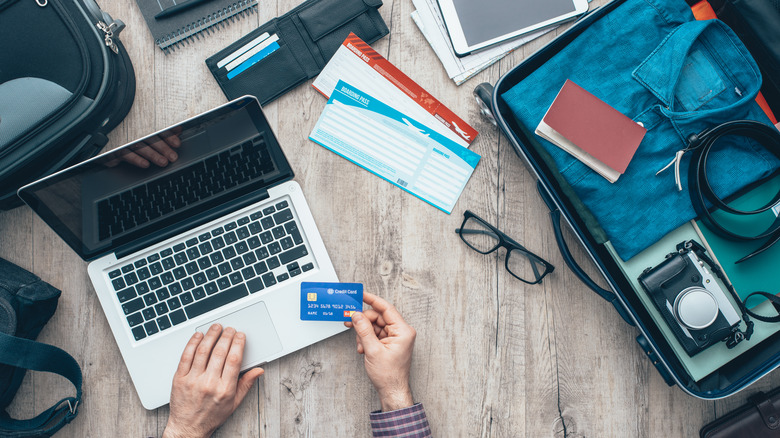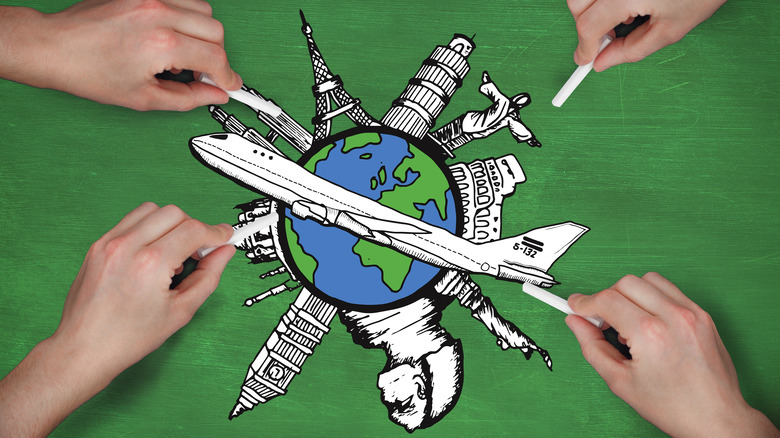Airline Booking Hacks That Might Be Too Good To Be True
Contrary to popular belief, you don't need to be rich to travel. While some travel gurus like to suggest traversing the world for almost nothing is possible, "nothing" will depend on how you define it. For most of us, traveling does cost something. Even if you hitchhike, busk, and couch surf your way to the next work exchange, traveling for nothing is a bit of a stretch.
Of course, some people do spend bucketloads on travel, which is great. Luxury travel is simply a luxury that some can afford. However, budget travelers are often able to still travel comfortably by diligently researching and planning with an open mind.
For many, the first travel expense also tends to be the most daunting — the flights. The prospect of spending $1,000 or more for a flight, before even considering other travel expenses, may dissuade you from taking that fantastic trip.
And as travel demand returns to pre-COVID levels, inflation lingers, and worker shortages plague airlines, experts predict the cost of airfare to increase in 2023. However, by implementing some airline booking hacks, you can find airfare that doesn't break the bank or your spirit to travel.
Consider open-jaw flights to chew up high prices
The only thing better than traveling is traveling cheaper, and there's often a correlation between itinerary flexibility and cheaper flights. Enter open-jaw flight itineraries.
Simply put, an open-jaw flight is an itinerary that uses multiple cities to fly you around. You may depart from one city but return to a different airport (origin open jaw), or fly to one destination but return using a different airport (destination open jaw).
For example, a one-way flight from JFK to Rome is $500 cheaper than flying from Raleigh-Durham to Rome. A one-way flight from Raleigh-Durham to JFK is only $150. If you can time it right, then you save $350 on your departure flight to Rome. You then fly from Rome back to Raleigh-Durham.
Using aggregator websites, it's typically easy to decipher if an open-jaw flight strategy is worth it. Sometime, an open-jaw itinerary is easier to perform using one-way flights and multiple airlines, while booking a multi-city flight itinerary using one airline group is the better way to go.
Don't knock the long, loot-saving layover
Have you ever been super-stoked to find a cheaper-than-expected flight, only to be disappointed by an uncompromisingly long layover. Sure, we all have. However, if you're openminded to long layovers, then you'll probably save on your travel. According to the The New York Times, a layover of 12 or more hours will typically save you an average of 6% on your flight.
And let's be clear. There's a difference between a 4.5-hour layover, which tempts you to leave the airport (with only a 50% chance of missing your connection), and a 24-hour or longer layover. An extended layover can actually be an exciting proposition. Let's say your final destination is Zagreb. For a considerably cheaper flight, you'll spend 36 hours in Barcelona getting there. Great! Eat some paella, visit a tapas bar, sleep, and continue your voyage.
Recently, incorporating long layovers has increasingly become a popular practice among those with flexible timelines. Airfare websites, such as Airwander, now actually specialize in locating or creating these types of flight itineraries. Some travelers also use skiplagging to reduce their airfare. Not a favorite of airlines (but still technically legal), skiplagging is an airline hack that using the layover destination as your actual, final destination to save money. You simply skip the remainder of your flight. So, yeah, layovers can be cool.
Goldilocks the timing for booking your flight
Finding the right time to book your flight is important. While some argue timing isn't as impactful as we've come to believe, these timing-agnostic naysayers tend to cite the exceptions rather than the rules. While one rule is that last-minute flights will be more expensive, it's less known that booking too far in advance can also cost you.
According to data compiled by Hopper, you will not typically find any price deals 150 days prior to your flight's departure date. The reasoning is pretty simple. Airlines set prices conservatively high before dropping them to meet consumer demand, travel trends, and other market forces.
While prices may begin to spike a few weeks before the flight date, these prices tend to fluctuate (a lot) from six months prior to flying until the last-minute bookings. So, if you book too early, then you're not even playing the game. And if you wait too long, the game is usually already over.
Know the perfect days to fly
Choosing what days to fly will almost always affect cost, barring special events or holiday travel. While this is more of a well-known fact than a hack, it's a little more nuanced than conventional wisdom. For one, where are you going?
According to Nerd Wallet, the best days to fly domestically in the U.S. are Tuesdays and Wednesdays, with Tuesday flights typically costing 24% less than peak flights on Sundays. After midweek flights, you can also save by flying on Mondays and Saturdays.
For international travel, however, Nerd Wallet reports that Wednesdays are the best days to fly, though price variance isn't as stark. By flying on Wednesday versus Sunday (still the peak flying day), you'll save about 12% off your international flight.
If you can't choose the absolute cheapest days to fly, try rearranging your flight dates with different week-of-day combinations. Most airfare aggregate sites offer "flexible date" searches, easily providing you with the best one-two ticket punch, and it's always a good idea to set airfare price alerts when possible.
To air is human, so look for mistake fares
Of all the tips that could help you travel cheaper, the crème de la crème of booking hacks has to be mistake airfare. Whether it's caused by a computer glitch, a currency conversion miscalculation, or human error, mistake airfares do happen — and more than you realize.
A mistake fare occurs when an online travel agency (OTA) or the airline itself advertises a price way cheaper than intended. While this doesn't occur every day, it does happen. According to Scott's Cheap Flights, the guru of glitch fares, mistake airfares typically occur roughly once a month (sometimes a bit less).
However, if you do come across a mistake fare, it's best to book directly with the airline ASAP. These mistakes may only last a few hours, and they usually disappear within 24 hours. Also, the airline is more likely to honor the pricing mistake than an agency.
So, as we've discussed, with a little know-how and gumption, you can keep the overall cost of travel down by spending less for airfare. However, since all the aforementioned hacks require some research and price comparisons, we should probably also debunk one persistent (but whack) hack: Airlines do not follow your web browser history, gauging your interest to fly, to inflate just your individual price. That would be creepy. This article will not affect your airfare to Toledo.





